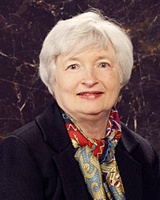Janet Yellen tipped to be next US Fed chief after Bernanke
18 Sep 2013
 67-year old Janet Yellen, vice chairperson of the Federal Reserve, has emerged as the frontrunner for the chair of the Fed or US central bank after President Barack Obama's preferred candidate, former presidential adviser Larry Summers, withdrew on Monday after his appointment was blocked by Senate Democrats.
67-year old Janet Yellen, vice chairperson of the Federal Reserve, has emerged as the frontrunner for the chair of the Fed or US central bank after President Barack Obama's preferred candidate, former presidential adviser Larry Summers, withdrew on Monday after his appointment was blocked by Senate Democrats.
If nominated and confirmed, Yellen would replace Fed chairman Ben Bernanke, whose second term expires in January.
Summers, a former treasury secretary under President Bill Clinton and a top economic adviser to Obama during the first two years of his presidency, dropped out of consideration for the post on Sunday because of opposition among fellow Democrats that would have made it difficult for him to be confirmed by the US Senate.
Yellen, who has a long career in the Fed system and chaired the White House council of economic advisers under Clinton, would be the first woman to hold the job.
According to Reuters, people familiar with the situation said Obama had largely whittled down his decision to two candidates, Summers and Yellen. With Summers out of the picture, Yellen moved to the top of the list. The president had mentioned former vice chairman Donald Kohn previously as also being under consideration. Adding further candidates to the list now was seen as unlikely.
An announcement is not expected this week. White House spokesman Jay Carney told reporters on Monday that Obama would announce his decision in the fall. "Calendar watchers will note that we are still in the summer," Carney said. The autumn officially begins on Sunday.
Analysts and former administration officials said Summers' withdrawal put Yellen in good position to be appointed. "We believe current Federal Reserve vice chair Janet Yellen is now the clear frontrunner, followed by former Federal Reserve vice chair Donald Kohn, with only a slim chance of it being somebody else," economists at Nomura wrote in a note to clients.
"Donald Kohn is an experienced and respected central banker, but he has not worked at the Fed since 2010. Financial markets would likely not react as well to his nomination and they would to Yellen's,'' Nomura remarked.
Summers' close relationship with Obama had given him the upper hand in the selection process. The former president of Harvard University helped lead Obama's economic team during the financial crisis that faced the White House when Obama took over in 2009. White House officials have stressed for weeks that the president had not made a final decision, however, and Yellen remained a contender even as Summers appeared to be on track to get the nod.
Progressive and women's groups had argued in favor of Yellen. Choosing a man after Summers' withdrawal likely would be seen as a symbolic slap against those important constituent groups, which helped Obama win re-election in 2012.




















